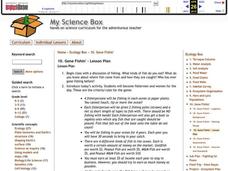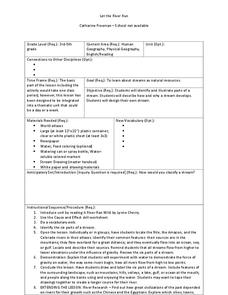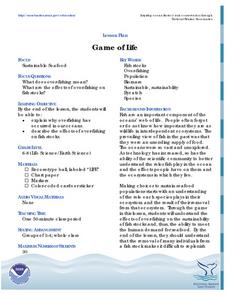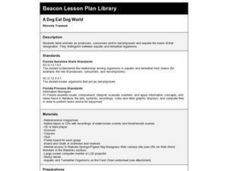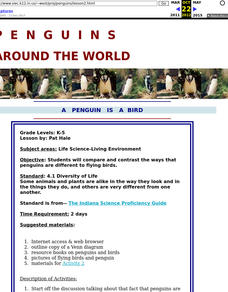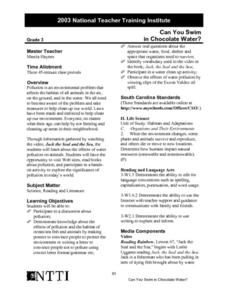Curated OER
Wildlife
The centerpiece of this lesson plan is a predator-prey simulation in which colored paperclips represent different species of animals camouflaged against a colored background. Relevant follow-up questions are provided. The activity is...
Curated OER
Ecosystems and Remote Sensing
Students obtain remote sensing data to compare and contrast global biomass data with global temperature data.
Curated OER
Biology Project: Gone Fishing
Students write a scientific article using data and prediction skills. In this scientific writing lesson, students access data about fishing off the coast of New Jersey. They look at satellite data, fluorometry and CTD data over a 3 -4...
Curated OER
Whales
First graders investigate two different types of whales; toothed and baleen. They describe what the different types of whale eat. They listen to a cassette of Dyan Sheldon's, The Whale Song before making stick puppets to dramatize the...
Curated OER
Limu in Your Lunch
Young scholars explore various types of algae found in Hawaii. For this science lesson, students research species of the three types of limu and identify various uses. Young scholars explore products that contain limu.
Curated OER
California Biodiversity
Students examine several maps of California exhibiting features such as precipitation, topography, and vegetation. They look for patterns that might be the source of or influence biodiversity in different regions. They pay particular...
Curated OER
The Future of Arctic Sea Ice
Students research about the importance of sea ice to world climate and sea organisms. In this earth science lesson, students create a model of present and future Arctic sea ice communities. They discuss how ice melting affects...
Curated OER
Sharks At Risk Viewing Guide
Learners complete a worksheet while viewing a film about sharks. They examine the reasons for overfishing of the oceans. They identify predator-prey relationships as well.
Curated OER
The Gulf of Maine
Students examine the effect of limiting factors, especially when it comes to human beings. They examine data from the Gulf of Maine area.
Curated OER
Squid Dissection
First graders participate in dissecting a squid. They identify and locate specific parts of a squid with teacher guidance. They draw a picture of what their squid looked like and label specific parts.
Curated OER
Bad Algae!
Students explore algal blooms. In this ecosystem and health lesson, students define and describe harmful algal blooms, then discuss ways in which the impact of these algal blooms could be reduced. Students work in groups to...
Curated OER
Gone Fishin'
Students experiment with population management in this hands-on lesson. In this biology lesson, students collect data on overuse of a resource and how to manage for sustainability. Students fish for m&m's using...
Curated OER
Energy Flow in Ecosystems
Middle schoolers, in groups, create a slide show about the ecosystem and answer critical thinking questions based on their research.
Curated OER
The Great Water Hunt
Students examine a globe to locate the bodies of water present and create a representation of those bodies of water for further exploration of the concept. Extensions of their observations are made at school, home, and the community.
Curated OER
Let the River Run
Students explore the environment by reading a story in class. In this water formation instructional activity, students define environmental terms such as rivers, streams, gulf, oceans and lakes. Students read the story A River Ran Wild...
Curated OER
Whale Watcher Game Lesson
Students participate in an online whale watching game. They identify the reasons for migration and describe the route. They make predictions on what would happen if the ways did not migrate.
Curated OER
Busy Otters
Students prepare for a trip to an aquarium by identifying otters, their body parts and behaviors as they read "Pup's Supper", do an otter pantomime and make a puppet. After their field trip, they complete a Venn Diagram of Otter behaviors.
Curated OER
Game of Life
By playing this game, students discover what happens to a fish stock when large amounts disappear.
Curated OER
Global Warming Statistics
Students research real-time and historic temperature data of U.S. and world locations, and analyze the data using mean, median, and mode averages. They graph the data and draw conclusions by analyzing the data. A spreadsheet is used to...
Curated OER
Primary Producers
Students examine the role of carbon in the oceans and how phytoplankton determine the levels present. In groups, they practice measuring primary productivity using two methods. They use the internet to research the role of phytoplankton...
Curated OER
Harmful Algal Blooms in Full Bloom
Students calculate the total percentage of samples from the data on the graphs. In this marine science lesson, students analyze the concentration levels over a period of time. They suggest ways to lessen the effect of these blooms.
Curated OER
A Dog Eat Dog World
Fourth graders distinguish between acquatic and terrestrial organisms. They label animals as producers, consumers, and/or decomposers.
Curated OER
A Penguin is a Bird
Students compare and contrast the ways that penguins are different to flying birds.
Curated OER
Can You Swim in Chocolate Water?
Third graders discss water pollution and its affects on animals. They watch a demonstration using a plastic fish in a fish bowl in which various types of water pollution are illustrated.











